Create DNS records at Register365 for Office 365
If Register365 is your DNS hosting provider, follow the steps in this article to verify your domain and set up DNS records for email, Skype for Business Online, and so on.
These are the main records to add. (Need more help? Get support.)
After you add these records at Office 365, your domain will be set up to work with Office 365 services.
If you have a SharePoint Online Public Website, you can set it up to use your custom domain for the website URL address, like www.your_domain.com.
Note: Typically it takes about 15 minutes for DNS changes to take effect. However, it can occasionally take longer for a change you've made to update across the Internet's DNS system. If you're having trouble with mail flow or other issues after adding DNS records, see Troubleshoot issues after changing your domain name or DNS records.
Add a TXT record for verification
Before you use your domain with Office 365, we have to make sure that you own it. Your ability to log in to your account at your domain registrar and create the DNS record proves to Office 365 that you own the domain.
Note: This record is used only to verify that you own your domain; it doesn't affect anything else. You can delete it later, if you like.
-
To get started, go to your domains page at Register365 by using this link. You'll be prompted to log in first.
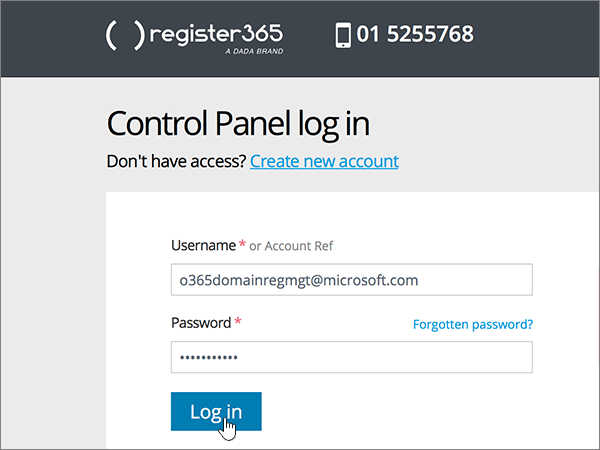
-
On the DNS Zones on Account page, in the Domain name column, choose the name of the domain that you're updating.
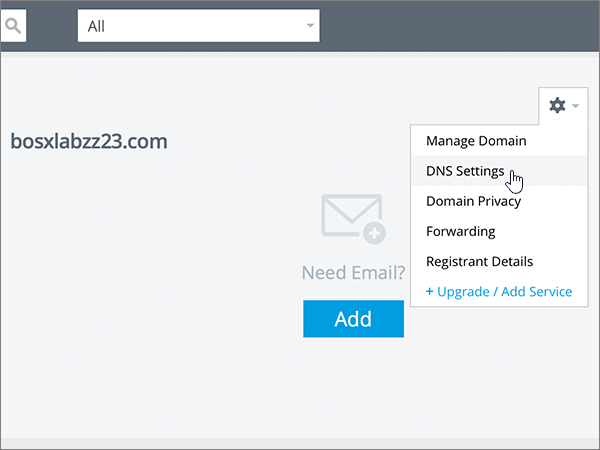
-
On the Add/Modify DNS Zone page, in the A, CNAME, AAAA, TXT and NS records section, in the boxes for the new record, type or copy and paste the values from the following table.
(Select the Type value from the drop-down list.)
(If you need to add a row, choose ADD A/CNAME RECORDS (+).)
(You may have to scroll down.)
Host name
Type
Result
(Leave this field empty.)
TXT
MS=msXXXXXXXX
Note: This is an example. Use your specific Destination or Points to Address value here, from the table in Office 365.
How do I find this?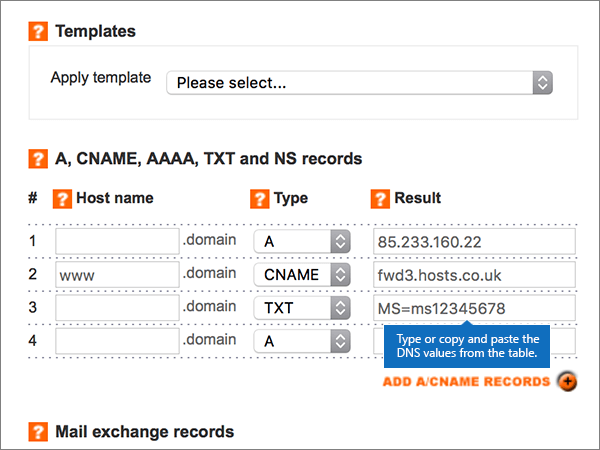
-
Choose Save.
(You may have to scroll down.)
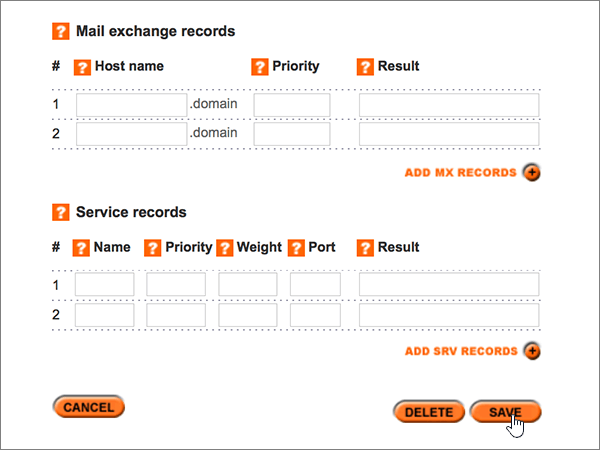
-
Wait a few minutes before you continue, so that the record you just created can update across the Internet.
Now that you've added the record at your domain registrar's site, you'll go back to Office 365 and request Office 365 to look for the record.
When Office 365 finds the correct TXT record, your domain is verified.
-
On the Manage domains page, select the domain that you are verifying and then, in the Action column for that domain, choose Start setup.
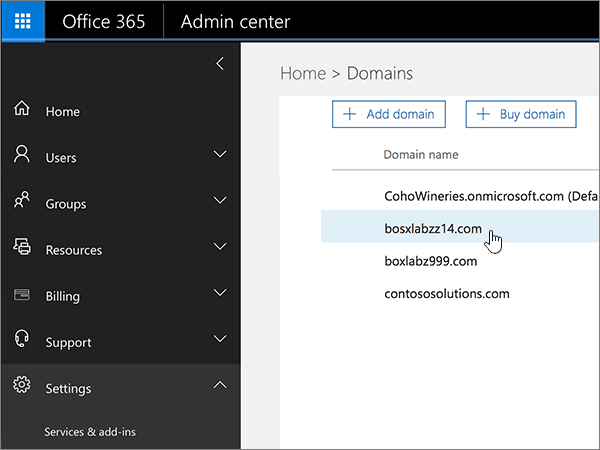
-
On the Add this TXT record to show you own domain_name page, choose Okay, I've added the record.
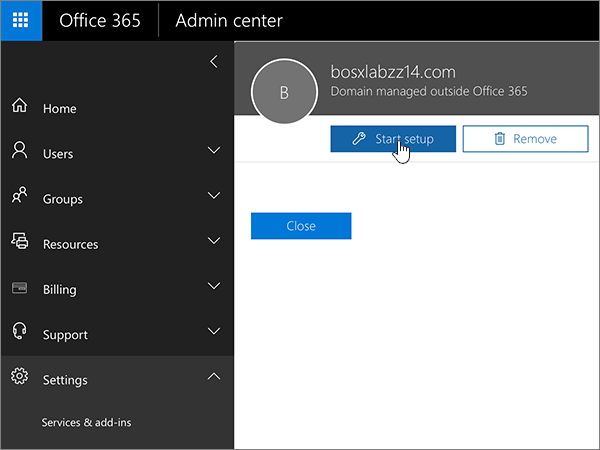
-
Choose Next.
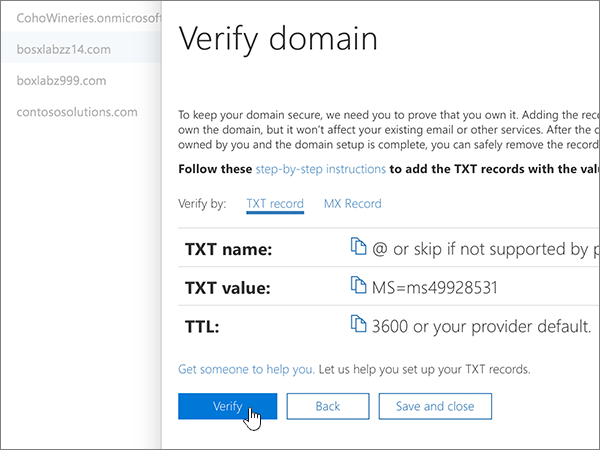
Note: Typically it takes about 15 minutes for DNS changes to take effect. However, it can occasionally take longer for a change you've made to update across the Internet's DNS system. If you're having trouble with mail flow or other issues after adding DNS records, see Troubleshoot issues after changing your domain name or DNS records.
Add an MX record so email for your domain will come to Office 365
-
To get started, go to your domains page at Register365 by using this link. You'll be prompted to log in first.

-
On the DNS Zones on Account page, in the Domain name column, choose the name of the domain that you're updating.

-
On the Add/Modify DNS Zone page, in the Mail exchange records section, in the boxes for the new record, type or copy and paste the values from the following table.
(You may have to scroll down.)
Host name
Priority
Result
(Leave this field empty.)
1
For more information about priority, see What is MX priority?
<domain-key>.mail.protection.outlook.com
Note: Get your <domain-key> from your Office 365 portal account.
How do I find this?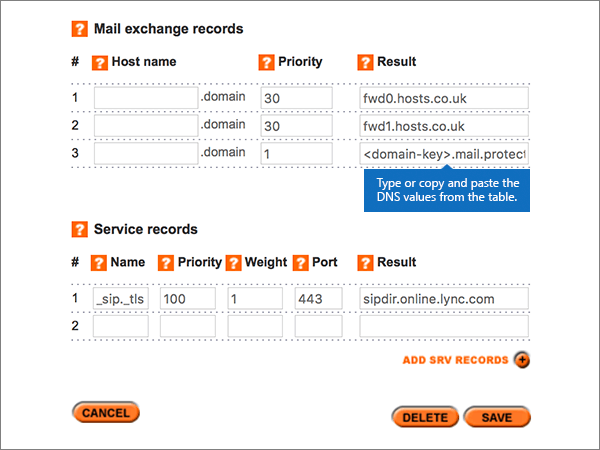
-
Choose Save.
(You may have to scroll down.)
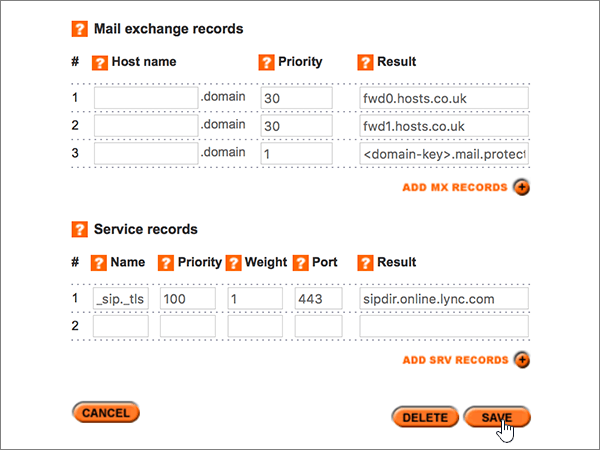
-
If there are any other MX records in the Mail exchange records section, delete each one by selecting it and then pressing the Delete key on your keyboard.
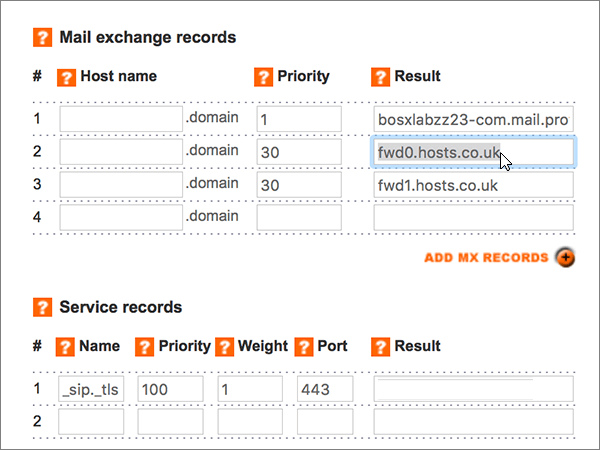
-
Choose Save.
(You may have to scroll down.)
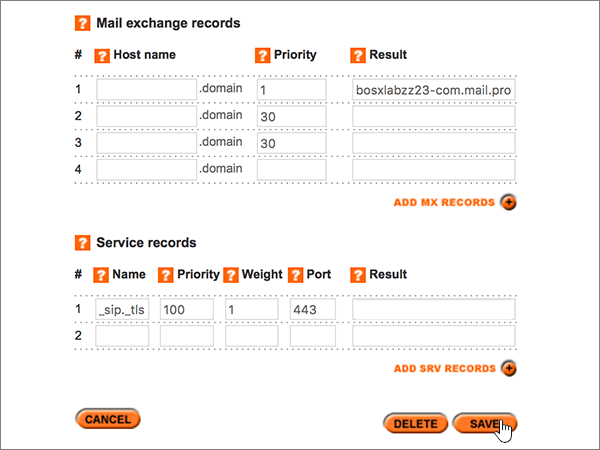
Add the four CNAME records that are required for Office 365
-
To get started, go to your domains page at Register365 by using this link. You'll be prompted to log in first.

-
On the DNS Zones on Account page, in the Domain name column, choose the name of the domain that you're updating.

-
On the Add/Modify DNS Zone page, in the A, CNAME, AAAA, TXT and NS records section, in the boxes for the new records, type or copy and paste the values from the following table.
(Select the Type value from the drop-down list.)
(If you need to add a row, choose ADD A/CNAME RECORDS (+).)
(You may have to scroll down.)
Host name
Type
Result
autodiscover
CNAME
autodiscover.outlook.com
sip
CNAME
sipdir.online.lync.com
lyncdiscover
CNAME
webdir.online.lync.com
msoid
CNAME
clientconfig.microsoftonline-p.net
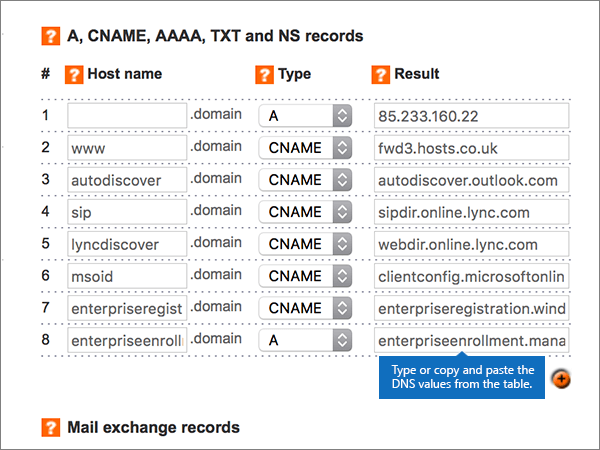
-
Important: If you have Mobile Device Management (MDM) for Office 365, then you must create two additional CNAME records. Follow the procedure that you used for the other four CNAME records, but supply the values from the following table.
(If you do not have MDM, you can skip this step.)
Host name
Type
Result
enterpriseregistration
CNAME
enterpriseregistration.windows.net
enterpriseenrollment
CNAME
enterpriseenrollment-s.manage.microsoft.com
-
When you have created all of the CNAME records that you need, choose Save.
(You may have to scroll down.)
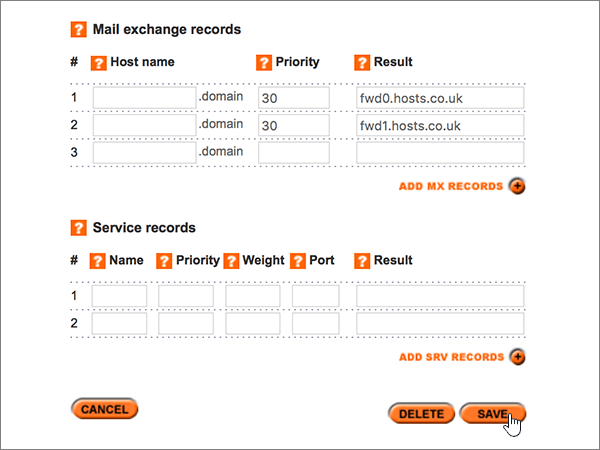
Add a TXT record for SPF to help prevent email spam
Important: You cannot have more than one TXT record for SPF for a domain. If your domain has more than one SPF record, you'll get email errors, as well as delivery and spam classification issues. If you already have an SPF record for your domain, don't create a new one for Office 365. Instead, add the required Office 365 values to the current record so that you have a single SPF record that includes both sets of values. Need examples? Check out these details and sample SPF records. To validate your SPF record, you can use one of these SPF validation tools.
-
To get started, go to your domains page at Register365 by using this link. You'll be prompted to log in first.

-
On the DNS Zones on Account page, in the Domain name column, choose the name of the domain that you're updating.

-
On the Add/Modify DNS Zone page, in the A, CNAME, AAAA, TXT and NS records section, in the boxes for the new record, type or copy and paste the values from the following table.
(Select the Type value from the drop-down list.)
(If you need to add a row, choose ADD A/CNAME RECORDS (+).)
(You may have to scroll down.)
Host name
Type
Result
(Leave this field empty.)
TXT
v=spf1 include:spf.protection.outlook.com -all
Note: We recommend copying and pasting this entry, so that all of the spacing stays correct.
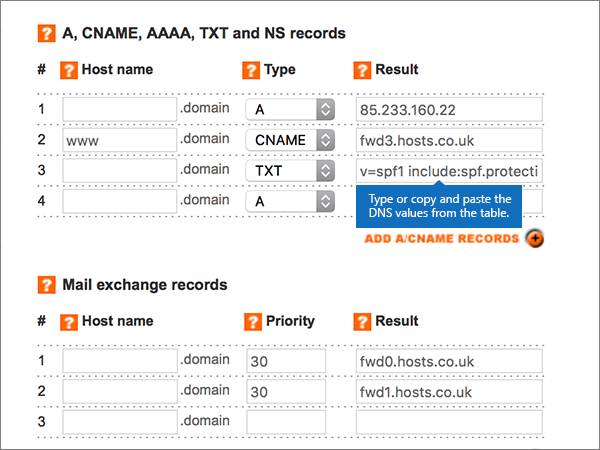
-
Choose Save.
(You may have to scroll down.)
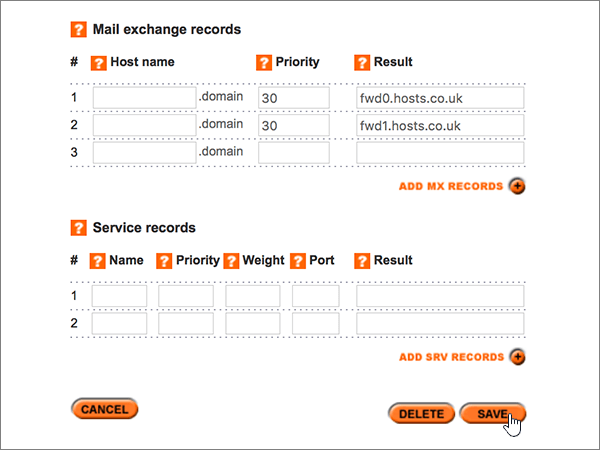
Add the two SRV records that are required for Office 365
-
To get started, go to your domains page at Register365 by using this link. You'll be prompted to log in first.

-
On the DNS Zones on Account page, in the Domain name column, choose the name of the domain that you're updating.

-
On the Add/Modify DNS Zone page, in the Service records section, in the boxes for the new records, type or copy and paste the values from the following table.
(You may have to scroll down.)
Name
Priority
Weight
Port
Result
_sip._tls
100
1
443
sipdir.online.lync.com
_sipfederationtls._tcp
100
1
5061
sipfed.online.lync.com
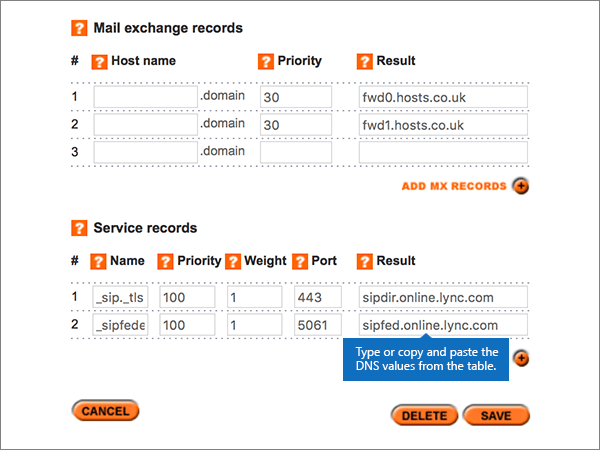
-
Choose Save.
(You may have to scroll down.)
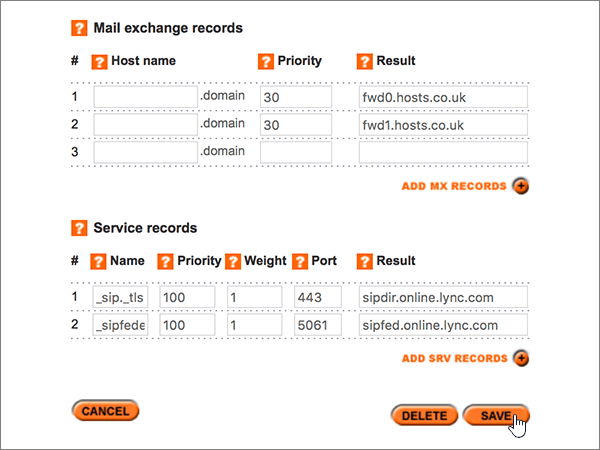
Note: Typically it takes about 15 minutes for DNS changes to take effect. However, it can occasionally take longer for a change you've made to update across the Internet's DNS system. If you're having trouble with mail flow or other issues after adding DNS records, see Troubleshoot issues after changing your domain name or DNS records.
Still need help?



No comments:
Post a Comment